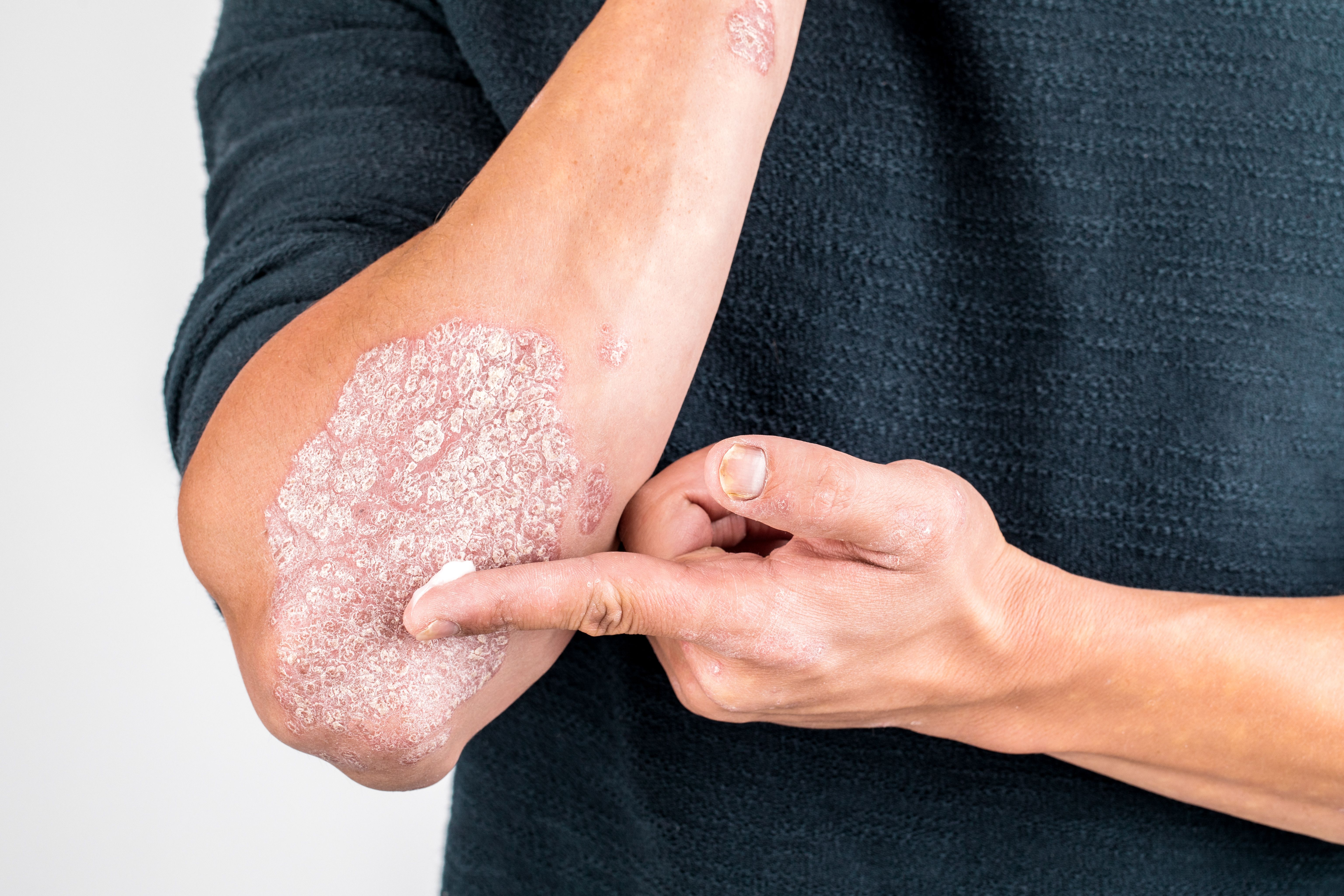- Case-Based Roundtable
- General Dermatology
- Eczema
- Chronic Hand Eczema
- Alopecia
- Aesthetics
- Vitiligo
- COVID-19
- Actinic Keratosis
- Precision Medicine and Biologics
- Rare Disease
- Wound Care
- Rosacea
- Psoriasis
- Psoriatic Arthritis
- Atopic Dermatitis
- Melasma
- NP and PA
- Skin Cancer
- Hidradenitis Suppurativa
- Drug Watch
- Pigmentary Disorders
- Acne
- Pediatric Dermatology
- Practice Management
- Prurigo Nodularis
- Buy-and-Bill
Video
Unmet Needs in Moderate to Severe Plaque Psoriasis Management
Author(s):
A brief discussion on the unmet needs and ongoing challenges in the treatment of plaque psoriasis.
Transcript:
Christopher G. Bunick, MD, PhD: Segment 3 is on the challenges and unmet needs in plaque psoriasis and psoriatic arthritis. Dr Lebwohl, the first question is for you. What are some challenges you face while treating a patient with moderate to severe plaque psoriasis? In particular, how do you address the cost of biologics? We touched on that a little. How do you address the cost of biologic therapies with your patients and manage that? Do you find treatment adherence to be a major issue?
Mark G. Lebwohl, MD: The biggest challenge has been the ability to get [the medications]. Insurance companies put up a lot of hurdles. We use the AAD [American Academy of Dermatology] denial letter often. Also, insurance companies change what they approve. In the past year, Cigna decided that patients who are doing well on secukinumab should be switched to ixekizumab, even though they’re doing well. That was quite aggravating. We fought that and were able to keep all my patients who were doing well on secukinumab on the drug. Ixekizumab is a great drug, and many of them would have probably done well. It’s an unwritten rule. If a patient is doing well on a drug that isn’t hurting them, why would you switch?
The second thing that happened in the past year was that Medicare changed the rules on the cost of certain drugs. Drugs that were self-administered historically have been part of your pharmacy benefit, so you’d sometimes have a large co-pay. The pharmaceutical companies have been wonderful at writing off the balance bill, the co-pay, for patients with commercial insurance. The problem is it’s against the law for Medicare and Medicaid. They can’t do that. We had a lot of patients on either ustekinumab, guselkumab, risankizumab, or tildrakizumab. All the self-administered anti-IL-23 drugs, with the exception of tildrakizumab, were put on a self-administered drug list by Medicare. That kept being delayed until after the public health emergency. Once the public health emergency was declared over, those patients had to start paying large amounts for their drugs, and they couldn’t afford it.
We ended up moving many of our patients to tildrakizumab. Tildrakizumab, interestingly, was developed by Merck, a company that had no presence in dermatology. They were the first IL-23 to be tested, but they also didn’t know how to design the trial properly. They ended up picking the wrong end point. They picked 12 weeks, when they should have picked a later end point. But 1 mistake that they made that turned out to be good was that they didn’t test it for in-home use, so Medicare is stuck. The FDA approved it for in-office use only. It had to be administered in the hospital or in the office, in which case it’s part of your medical benefit and is completely covered.
There’s a little dilemma that pertains to something we said recently when you switch within classes. If you went from a drug like guselkumab, which starts to wear off within a couple of months of stopping it, and you move to a drug like tildrakizumab, if you look at the peak effect in the published clinical trials for tildrakizumab, it’s 7 months. It’s a very slow drug. During the period of several months where the guselkumab or ustekinumab is wearing off and the tildrakizumab is not kicking in, I don’t have a lot of options. I’m with Helen. I do exactly what she does. If I’m not seeing the patient respond by 3 months—but I get nervous earlier—I’m thinking about switching them. I don’t have a choice in these patients. They can’t afford the other drugs, so I encourage them to wait it out for several months, which often works. I see patients who didn’t respond even at 3 or 4 months respond at 7 months.
Christopher G. Bunick, MD, PhD: Dr Wu, what are some of the remaining unanswered questions or unmet needs regarding the treatment of plaque psoriasis in your opinion?
Jashin Wu, MD: It would be interesting to know if some of these newer agents will be effective in the pediatric population. We have 4 of these biologics—etanercept, ustekinumab, secukinumab, and ixekizumab—approved for children, but we don’t have any approved in the interleukin-23 class. I’m guessing those will be approved in the near future. I’m sure they’ll be safe, but they’re not approved. Another unanswered question is what the risks of infection are with these newer agents. I’m very comfortable using these newer agents, the IL-23 and IL-17 blocking classes, in terms of risk of infections, but we don’t have much long-term registry data. That would be interesting to see in the near future.
Christopher G. Bunick, MD, PhD: Dr Torok, what medications on the horizon for plaque psoriasis or psoriatic arthritis are you most excited about?
Helen Torok, MD: Obviously bimekizumab, but I’m really excited about the JAKs and especially the TYKs. I have a little angst about JAKs because of all the adverse effects and toxicity. But the TYK2s will be a really exciting opportunity. The other thing is we’re getting topical JAKs, which are approved for atopic dermatitis, for not only psoriasis but also vitiligo and alopecia areata. Those are the exciting drugs coming out.
Christopher G. Bunick, MD, PhD: All 3 of you would agree that there are some patients who come into clinic and say, “Doctor, I don’t like needles. I don’t want a needle. Give me an oral pill.” Do you hear that all the time?
Helen Torok, MD: Yes, a lot.
Jashin Wu, MD: Yes, definitely.
Christopher G. Bunick, MD, PhD: This push for oral systemic agents is still a big unmet need.
Transcript edited for clarity.






